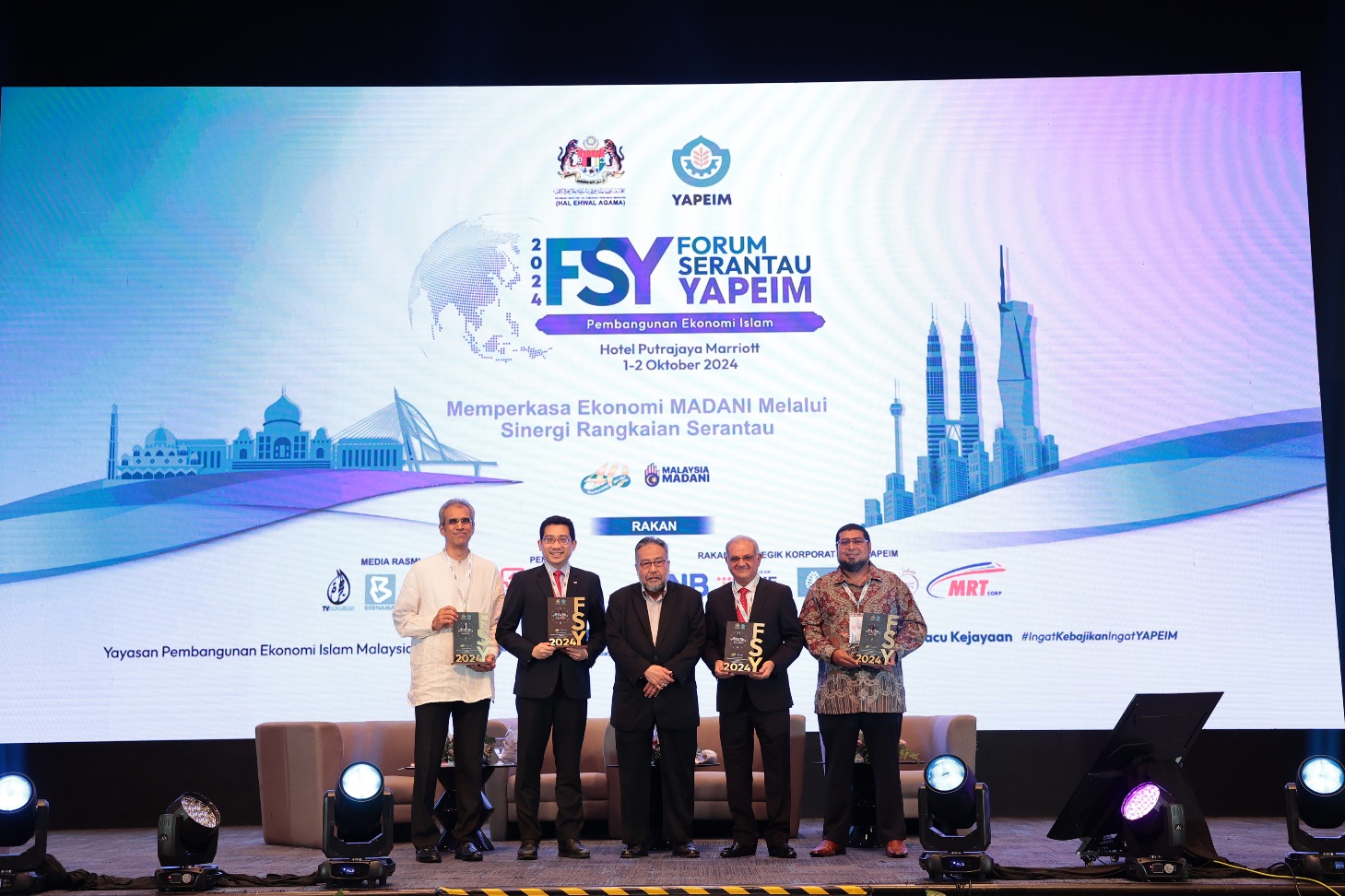The Forum Serantau YAPEIM 2024 (FSY2024) has attracted more than 600 participants from various sectors to sit and hear over 60 featured panellists and moderators from Malaysia, Indonesia, Singapore, Brunei, Thailand, Cambodia, and the United Kingdom during its two-day event on 1st and 2nd October 2024.
Officially opened by Deputy Prime Minister Dato’ Sri Haji Fadillah bin Haji Yusof and under the theme “Empowering the MADANI Economy through Regional Synergy,” discussions covered key issues such as extreme poverty and inequality, Islamic finance, fintech, high-value economy, green economy and sustainability, digital economy, entrepreneurship, youth skills and employment, halal industry, Islamic tourism, and strengthening Islamic institutions and agencies.
The event also included four masterclasses focussing on cultural nudge, social investment impact assessment, collaborative opportunities with YAPEIM, and sustainable funding techniques for NGOs.
FSY2024 aimed to bring together practitioners and thought leaders in Islamic economic development to identify current challenges, develop strategies for advancing the Muslim economy, and enhance economic relations among communities in the archipelago (Nusantara) region.
Shan Saeed, Chief Economist at Juwai IQI, opened the parallel session titled “Raising the Ceiling and the Floor: Islamic Finance, Fintech, and Impact on the Economy” with a macroeconomic analysis that highlighted Malaysia’s favourable position in the global market while emphasising the importance of a collaborative approach to financial inclusion.
He highlighted the importance of seizing opportunities for foreign investments and innovation as vital steps toward empowering the MADANI economy through regional synergy. Saeed projected a potential exchange rate of RM3.5 to the USD, illustrating how strategic economic partnerships can bolster Malaysia’s growth and enhance financial inclusion across the region.
The discussion on financial inclusion was spearheaded by Eqhwan Mokhzanee, CEO of AmBank Islamic, who presented compelling evidence of Malaysia’s remarkable advancements in enhancing financial access for all. He underscored the critical role of Bank Negara Malaysia’s (BNM) financial inclusion roadmap, which serves as a strategic framework guiding the nation toward a more inclusive financial landscape.
Eqhwan highlighted transformative initiatives like the iTekad programme, designed specifically to empower microenterprises by providing tailored financial solutions and resources.
“By equipping these businesses with the necessary tools and support, we are not only fostering entrepreneurship but also driving economic resilience and community development,” he asserted.
Umar Munshi, Co-Founder and Group Managing Director of Ethis Group, emphasised the vital importance of collaboration among banks, fintechs, and other stakeholders to forge an inclusive financial ecosystem.
“By working together, we can leverage each other’s strengths and create comprehensive solutions that address specific community needs,” he stated, highlighting that true progress in financial inclusion cannot be achieved in isolation.
“This is not just about competition; it’s about creating a holistic approach that benefits everyone in the community,” he asserted.
In his idealised financial landscape, cooperation empowers both people and companies, encouraging a sense of shared accountability and mutual development on the path to financial success.
The panel also delved into the critical roles of risk mitigation and financial literacy in empowering individuals and businesses alike.
Umar highlighted that enhancing financial literacy is not just beneficial; it is fundamental to enabling informed decision-making and fostering economic resilience. “When individuals understand financial concepts and products, they are better equipped to navigate uncertainties and make choices that positively impact their lives and businesses,” he explained. Umar stressed that a financially literate population can mitigate risks more effectively, reducing vulnerabilities during economic downturns.
By investing in education and resources that bolster financial understanding, we can cultivate a community that not only thrives in stability but also innovates in times of challenge. This approach is essential for creating a robust economic foundation where every participant feels empowered and capable of contributing to the broader economy.
Moderated by Dr Mohamed Ashraf bin Mohamed Iqbal, Chairman of Waafi Bank and Founder of MindSpring, the session concluded on a high note, filled with optimism for Malaysia’s economic future.
The panellists collectively acknowledged the immense potential of Islamic finance and fintech as powerful drivers of sustainable growth.
They emphasised that these sectors are not only poised to enhance financial inclusion but also to elevate Malaysia’s position as a leader in the global economic landscape. “In the context of Malaysia’s unwavering commitment to inclusivity, we have a unique opportunity to harness these innovative financial solutions to empower underserved communities,” Dr Ashraf noted. The discussion reflected a shared belief that by fostering collaboration and embracing technological advancements, Malaysia can cultivate a more equitable economy that benefits all segments of society.
Islamic Economic Development Foundation Malaysia (YAPEIM) is an agency under the Prime Minister’s Department (Religious Affairs) established on 13th October 1976, and relaunched in 1984.
YAPEIM plays a crucial role in enhancing community welfare through Islamic economic development. The agency provides educational assistance to targeted groups, offers community programmes — both ongoing and one-off — and makes charitable donations to those in need.
